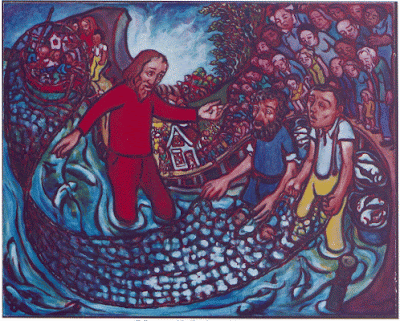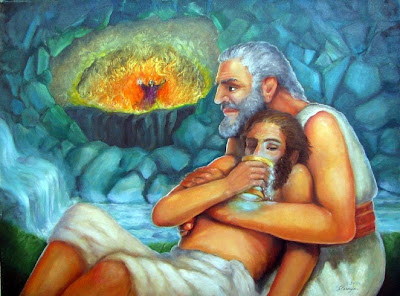Luke 5:1-11; 1 Peter 3:8-15; 1 Kings 19:11-21
In the Name of the Father and of the + Son and of the Holy Spirit.
There were two boats. Jesus, the Messiah, came to fill one of them and to leave the other boat empty. Our Lord chose Simon’s boat. He stepped into it, had Simon push out a little from the land, and then He sat down and began to preach.
There were two boats. One remained tied to the land and worldly concerns, empty, while the other floated on the water like an ark, tossed about by the wind and the waves; but it was not empty, it carried the Lord of the wind and the waves and of all creation, the Word of God that gives life to the world. The first boat is the church of the Law, the synagogue. The second boat is the Church of Christ, the Church of the Gospel, the ark of salvation, in which the Lord saves His children from death in this wilderness world and from the depths of their guilt and sin.
After teaching the masses on land, our Lord prepared His Church for service to the world. Jesus commanded Simon to put out into the deep and let the nets down for a catch. Simon, having just finished cleaning his nets, weary from the night’s profitless labor, did not want to do as His Master had commanded; everything that his experienced wisdom informed him and that his own eyes beheld told him that this was senseless and fruitless. Nevertheless, out of respect for his Master, more than love or faith, he obliged to Jesus’ Word. And, soon the pair were hauling in more fish than either their nets or boat could bear! They called to their idle companions, James and John, to come and help. And soon their nets and boat were filled to breaking and overflowing too!
How is this possible? When men have exhausted their efforts and abilities and are ready to throw in the towel, defeated, in the most foolish of times and of places, in the most unlikely of situations, they find that they are catching fish wholly despite their own weaknesses and failings. Indeed, our Lord often puts us in such predicaments so that we can see that it is not we who are doing the catching of fish at all!
Simon had an epiphany; his eyes were opened, and he knew who it was that stood before him, the Holy One of God, the Messiah. And Simon knew who he himself was, a poor miserable sinner who should not live in the presence of God’s holiness and glory. And he was correct. Thus, Jesus absolved Simon, He forgave him his sins saying, “Do not fear, but know, you are no longer merely a fisherman, but you will catch men lost in the depths of sin and death and unbelief.” For, no one has an encounter with the Lord of Creation Jesus the Christ and walks away unchanged. You may receive Him in faith to your great blessing, or you may reject Him in unbelief to your judgment, but you will be changed. And, you have been changed.
For, Jesus takes the stuff of His creation – common boats and buildings, common people and their common vocations – and He transforms them into powerful tools and instruments in His work of seeking and saving the lost. The boat was a common fishing boat, now it is a symbol for the ark of salvation, the Church. The net was a common fishing net, now it is a symbol for the Means of Grace, Word and Sacrament, by which men are caught out of sin and death and brought into the safety of the Church. And Simon, James, and John were common fishermen, now they are fishers of men, preachers of the Gospel of Jesus Christ. They knew that everything had changed! So, they brought their boats to land, left them, and followed Jesus from that day forward.
But why does the Lord work in such mysterious ways? Why all the hiddenness and symbolism? Why doesn’t He just come out with powerful works and convince everybody that He is God in human form, the Messiah and savior of the world? Well, sometimes He did. Many people witnessed Jesus’ miracles firsthand: The feeding of 5,000 with five loaves of bread and two fish. The stilling of the storm. Walking on the water. Even raising several persons from the dead! Was everyone convinced in Jesus’ day? Did everyone believe? Does everyone believe today? No. For, as Father Abraham replied to the rich man in hades, so is it true today: “If they do not hear Moses and the Prophets [the Word of God], neither will they be convinced if someone should rise from the dead.'"
For, the Word of God is not a very flashy thing before the eyes of men. We are much more impressed by bright lights, loud noises, and big shows. Not unlike many in the Church today who look at Her declining numbers and seeming irrelevance in the world and are disheartened, so too the prophet Elijah was disheartened in his day, saying, “The people of Israel have forsaken your covenant, thrown down you altars, and killed your prophets with the sword, and I, even I only, am left, and they seek my life, to take it away.” To put that in layman’s terms, Pastor Elijah observed that God’s Church was in shambles. No one kept the Lord’s commandments. No one made the Lord their first priority. No one tithed, but they gave grudgingly of what was left rather than of their first fruits. They wanted to throw out the prayers (the Liturgy) and the sacrifices (the Means of Grace) and even the pastor who faithfully insisted that these must be kept. So, today there are many pastors that would voice Elijah’s despair and there are many churches that resemble the people of Israel. The boat and nets passed down to us from our forefathers seem foolish, antiquated, and irrelevant in today’s culture with its high-technology, visual-orientation, and fast pace, we sometimes feel like screaming: “We’ve fished all night with these boat and nets and have caught nothing!”
“But at Your Word we will let down the nets.” For, it is not by man’s power, reason, or will that fish are caught and men are saved; it is by the power of the Word of the Lord in His ark of salvation, the Church, working in and through our humble and common nets of water, word, bread and wine. These humble elements are transformed into powerful Means of Grace by the Word made flesh Jesus Christ who is present in His Church in, with, and under these elements for the life of the world. He is not in the great and strong wind. He is not in the mighty earthquake. He is not in the raging fire. But He is the still small voice, even a whisper, saying, “I Am the Word of God made flesh, crucified, died and buried, risen from the dead, ascended to the Father, reigning, returning for you. Do not be afraid, from now on you will be catching men.”
And the Word of God is powerful and efficacious; it brings about what it says. For, by the Word of God you have been caught and called and pulled into the ark of salvation; and by the Word of God in your Holy Baptism and faith you have been transformed to catch others with the Gospel Word in your holy vocations. St. Peter teaches you how to do this: “All of you, have unity of mind, sympathy, brotherly love, a tender heart, and a humble mind. Do not repay evil for evil or reviling for reviling, but on the contrary, bless, for to this you were called, that you may obtain a blessing. […] Have no fear of them, nor be troubled, but in your hearts honor Christ the Lord as holy, always being prepared to make a defense to anyone who asks you for a reason for the hope that is in you; yet do it with gentleness and respect.”
In the + Name of Jesus. Amen.


.jpg)




